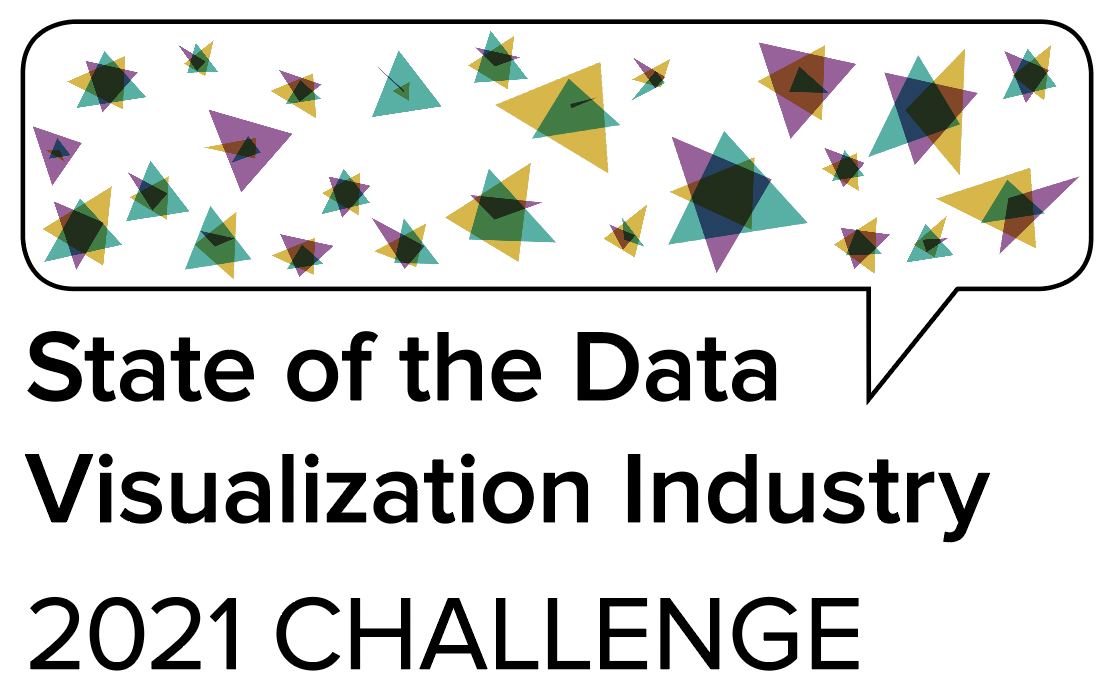The Data Visualization Society is pleased to announce a two-month challenge, focused on the results of the 2021 Data Visualization State of the Industry (SOTI) Survey. Entries are due by Monday, 24 January 2022. This contest is open to DVS members at all levels (Basic, General, and Patron). If you are not a member, you can sign up here.
Survey Data
The 2021 Data Visualization SOTI Survey has responses to 60+ questions and was taken by over 2,100 people. It covers professional details like roles and tasks, tools and charts, experience, compensation, work contexts, challenges and changes (COVID-19 specific and otherwise), and more, plus demographic details. Naturally, we want to visualize it!

Challenge
Help us better understand the community and the results of the survey. Entries can be submitted in two categories: Exploratory and Explanatory. Each category will be judged by a panel of experts and awarded a 1st, 2nd, and 3rd place.
The top 30 entries will be placed in a gallery on the Data Visualization Society website. The judges may also award one prize each for the entries from either category that best demonstrate accessibility and beauty.
Further details and resources will be posted in upcoming weeks. Check back in late November and mid-December on the challenge page and here in Nightingale.
Inspiration & Community
To exchange questions, critiques, or otherwise collaborate as you engage this data, join the #dvs-challenges channel in our Slack workspace!
To browse past entries for inspiration, see the 2020 and 2019 galleries.
There are many many questions that can be addressed with these survey responses, and we encourage you to explore the data, come up with your own questions, and find stories to share. If you’re feeling stuck or overwhelmed by the sheer volume of topics, here are a few prompts you could explore to get started:
- Who are the people that do data visualization as part of their profession or as a hobby? Where are we from? What do we do for work? How many years have we been doing data visualization? What are differences between veteran and new visualizers?
- How do data visualizers work? How many hours do we spend on dataviz each week, by job/role and tasks? What tools do we commonly use, and does this differ by role and/or opportunity to choose? What chart types are popular in 2021?
- What challenges do data visualizers face? What are our biggest frustrations? What are common barriers and misunderstandings? Do challenges differ by role, job type, industry, or other variables?
DATA ON “ROLES”
Note that the 2021 survey asked about “roles” with two distinct lists (matching 2020):
(1) Your role(s) as a data visualizer in the past year. This first question listed seven select-all-that-apply options: Freelance, Employee, Hobbyist, Student, Academic/Teacher, Passive income, Prefer not to say. Each of the first five choices led to role-specific followup questions.
(2) Best match for your job role. This followup question (asked separately for Freelance and Employee) listed ten select-one options: Analyst, Cartographer, Designer, Developer, Engineer, Journalist, Leadership, Scientist, Teacher, None of these. The first nine choices were presented to each respondent in randomized order.
Rules
- Each person can only enter two submissions total and only one submission for each category.
- Entries are open to Data Visualization Society (DVS) members. If you are not a member, it’s easy and free to join. Sign up here.
- Groups may enter, but any cash-value prize will be awarded to the individual submitting the entry. Any group entry must be a list of names and cannot be an organization. (You are welcome to give the name of your organization in the description of the entry, however.)
- Entries must use data from the 2021 Annual State of the Industry Survey. You are also welcome to use annual survey data from previous years or other relevant datasets. If you use any such datasets, they need to be cited.
- Any work presented must be your own.
- By entering you give DVS the non-exclusive right to publish your work and/or screenshots of it. (Examples of use include: social media, website, emails, and reports.)
- All work must adhere to the DVS Code of Conduct.
- DVS board members, advisory committee, challenge judges, and their immediate family are not eligible to win prizes. However, they may enter and be included in the gallery.
Thank you!
Many thanks to every one of you who took the time and thought to respond to the survey and/or provide constructive feedback. This dataset and challenge would not have been possible without your contributions, the efforts of our fellow 2021 survey committee members, and the support of the DVS Board.














